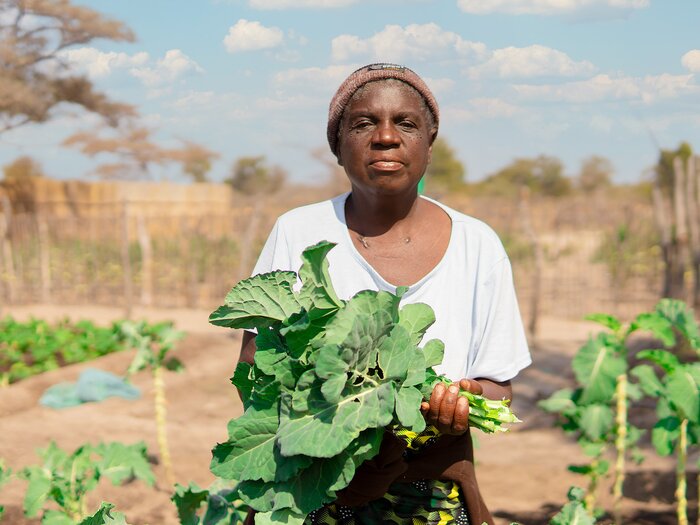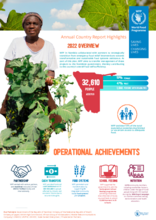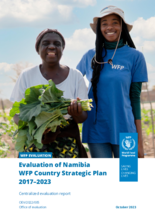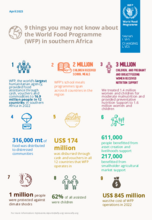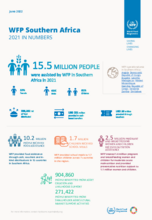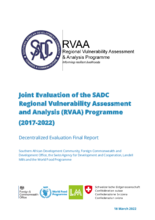Namibia
- 18%
- live below the national poverty line
- 22%
- of people were unemployed in 2021
- 2.5 million
- population
Namibia is an upper-middle-income country, with a population of 2.5 million people. Despite this classification, 18 percent of Namibians live below the national poverty line. Over a fifth of people were unemployed in 2021, mostly women and youth.
According to the 2022 Global Hunger Index, Namibia suffers from a serious level of hunger, ranking 78th out of 116 countries. The country imports up to 80 percent of its food, as not all goods can be sourced locally. Malnutrition is a growing concern, with 24 percent of children under the age of 5 stunted (reduced growth relative to age), 6 percent experiencing wasting (weighing too little for their height) and 13 percent underweight.
The impact of the current global and national food-price crisis on food security is heightened by various factors, including: low production of food and livestock in communal areas, mainly due to limited access to modern farming technologies and practices; poor soil fertility; overgrazing; prolonged dry spells; limited access to markets; and land-use practices. Approximately 54 percent of smallholder farmers are women who live in communal areas, where access to land and water is challenging.
What the World Food Programme is doing in Namibia
-
Rural transformation
-
WFP is developing a National Integrated Programme for Rural Transformation. Its goals include agricultural innovation and productivity, employment creation, small and medium-enterprise development, trade facilitation, market access and value chain development, through a multisectoral and multi-stakeholder approach.
-
Climate resilient livelihood support
-
WFP provides technical support to the Government on drought-monitoring systems, early mitigation action and long-term sustainable investments for drought-resilient communities. Additionally, WFP is transitioning from cash-based transfers to government programmes that restore rural community assets such as schools, water points, roads, and health centres. At the same time, WFP is advocating for sustainable agricultural livelihoods through vouchers for work, quality seeds and agricultural inputs.
-
Digital transformation
-
WFP’s technology expertise allows stronger coordination with partners and the use of digital platforms to manage targeting, beneficiary data, reporting and information sharing. This in turn enables the delivery of national social protection and safety net programmes, and school feeding programmes.
-
Home-Grown School Feeding
-
WFP provides technical support to the Government in the design and implementation of culturally appropriate school menus, through the Home-Grown School Feeding Programme. Evidence from the pilot shows increased availability of diversified food, dietary and micronutrients intake for schoolchildren and their families. This increases children’s attendance and their ability to learn. For smallholder farmers and traders, the programme creates a predictable income, and boosts local agricultural production and economy.
-
Addressing malnutrition and stunting
-
WFP works with the Government to address stunting and malnutrition through community sensitization on diet diversification and consumption of indigenous healthy food. At the national level, WFP conducted comprehensive baseline studies to update outdated data on national statistics and recommend applicable solutions through government programmes and policy dialogues.
-
Food Systems via Supply Chain and Markets’ strengthening
-
Working in partnership with regional governments and selected communities, WFP has established over 30 Integrated food systems projects countrywide aimed to demonstrate the use of appropriate and climate-smart technology to produce nutritious and high-value crops. One of WFP’s flagship projects: Stampriet School Integrated Food Systems Project is aimed to improve the availability and accessibility of healthy and nutritious diets for school children. The community-based projects are intended to be a one-stop shop for knowledge sharing, skills transfer and development, promotion of technology, promote nutrition education and link farmers to markets with the goal to improve food and nutrition security. WFP’s Food System approach strengthens institutional collaboration across the entire food systems value chain: production, harvesting, storage, processing, aggregation, distribution, marketing, and consumption, for both crop and livestock products.
Namibia news releases
Go to pagePartners and donors
Find out more about the state of food security in Namibia
Visit the food security analysis pageOperations in Namibia
Contacts
Office
38-44 Stein Street, Klein Windhoek
Windhoek
Namibia

